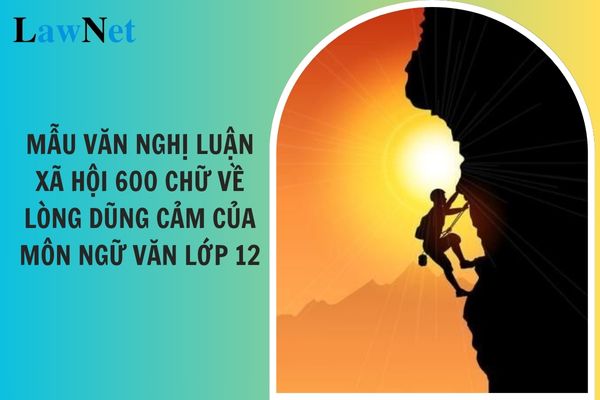Vietnam: What is the sample 600-word social argumentative essay on courage under the 12th-grade Literature curriculum? What learning outcomes are required for social argumentation content in the 12th-grade Literature curriculum?
What is the sample 600-word social argumentative essay on courage under the 12th-grade Literature curriculum in Vietnam?
Below is a sample 600-word social argumentative essay on courage under the 12th-grade Literature curriculum in Vietnam:
Courage is one of the noble qualities of human beings, reflecting the mental strength to overcome fear, confront difficulties, challenges, and dangers, and to do useful things for oneself and society. Courage is not only a necessary virtue in perilous situations but also an important factor that helps individuals rise in life.
Firstly, courage helps people overcome fear and boldly face challenges and difficulties. Life is always full of obstacles and not everything goes as desired. People lacking courage often give up easily when faced with difficulties or challenges. Meanwhile, courageous individuals are ready to confront problems, persistently overcoming adversity, whether it's failures or hardships in studies, work, or social relationships. For instance, a courageous student will not lose heart when facing a difficult exam but will strive to learn and improve themselves. A courageous worker will not fear failure but instead always find ways to rectify mistakes and achieve success.
Secondly, courage is an essential quality for defending what is right and fighting for justice. Courage not only helps individuals overcome life's difficulties but also motivates them to stand against injustices and defend righteousness. Historically, we have witnessed many heroic examples, people who have sacrificed for noble ideals, for freedom and justice. Warriors and leaders in the struggles for national independence and freedom have shown courage when facing death, enduring hardships, and sacrificing to protect the country. Courage is present not only in wars but also in daily life, in struggles against corruption, and in defending the rights of the vulnerable in society.
However, courage must also be paired with wisdom and reasoning. Courage does not mean blind action but is bravery based on understanding and thoughtful consideration. Courage can lead to success, but without careful consideration, it can result in severe consequences. Therefore, courage needs to be realized within the framework of reasoning and ethics so that every action brings valuable results for oneself and society.
Finally, courage is not something innate but a quality that can be cultivated daily. Each person can learn and develop courage through small actions, from daring to stand up for the truth, to facing failure and finding ways to overcome it, from fighting for their rights to protecting humanistic values in society.
In summary, courage is a precious quality that helps people overcome challenges, uphold righteousness, and contribute to societal development. Courage needs to be nurtured and promoted so that each individual can firmly tread life's path while also contributing to creating a fairer and better society.
Note*: This sample 600-word social argumentative essay on courage under the 12th-grade Literature curriculum in Vietnam is for reference only!*

What is the sample 600-word social argumentative essay on courage under the 12th-grade Literature curriculum in Vietnam? What learning outcomes are required for social argumentation content in the 12th-grade Literature curriculum? (Image from the Internet)
What learning outcomes are required for social argumentation content in the 12th-grade Literature curriculum in Vietnam?
According to the General education program in Literature issued together with Circular 32/2018/TT-BGDDT, learning outcomes required for argumentation content in the 12th-grade Literature curriculum in Vietnam are as follows:
- Content Comprehension
+ Identifying and analyzing the content of the thesis, arguments, logic, and unique, distinctive evidence in texts; indicating their connections; evaluating the appropriateness between the argumentative content and the title of the text.
+ Capable of receiving and critically evaluating the content; recognizing the purpose.
- Form Comprehension
+ Analyzing and evaluating how the author utilizes certain argumentative procedures (such as proving, explaining, commenting, comparing, analyzing, or refuting) in texts to achieve the purpose.
+ Analyzing rhetorical measures, vocabulary, affirmation, and negation sentences in argumentative texts and evaluating the effectiveness of using these forms.
+ Identifying and analyzing the roles of argumentative structures and expressive language in argumentative texts.
Is the education program in Vietnam required to ensure scientific characteristics?
Under Clause 2, Article 8 of the Education Law 2019, the regulations regarding the Education Program are as follows:
Educational programmes
1. Educational programmes shall reflect the goals of education; set the standards for knowledge, skills, requirements on quality and capacity of learners; scope and structure of educational contents; methods and forms of organizing educational activities; evaluation methods of educational outcomes for each subject of every grade and level or for each subject, module, specialization of every training qualification.
2. Educational programmes must ensure the scientific and practical characteristics; inheritability and transferability among different levels and different training qualifications; facilitate the classification of students and exchange between training qualifications, specializations and educational forms in the national educational system in order for localities and educational institutions to proactively implement suitable educational plans; satisfying the goal of gender equality and demands of international integration. Educational programmes are the basis of comprehensive education quality assurance.
3. Requirements on knowledge, skills and on dignity and capacity of learners defined in educational programmes must be concretized in textbooks used for general education, in syllabi and teaching materials used for vocational education and higher education. Textbooks, syllabi and teaching materials must meet the requirements on educational methods.
...
Thus, according to this regulation, the Education Program must ensure scientific accuracy.

